Perplexity AI vs ChatGPT: AI App Comparison
Perplexity AI and ChatGPT are two popular AI platforms that offer advanced capabilities in language understanding and content generation.
Perplexity AI focuses on delivering accurate, information-rich responses, drawing from a vast database of sources for users who require depth and reliability in their queries. In contrast, ChatGPT, leveraging OpenAI’s GPT models, is well-known for its enormous range of capabilities, from creating text to mimicking nuanced, human-like conversations.
- Perplexity AI: Best for research-oriented AI assistance.
- ChatGPT: Best for a wide range of conversational AI uses.
Keep reading to understand how Perplexity AI’s focus on research-oriented, source-backed responses compares with ChatGPT’s versatile AI conversational capabilities across their features, strengths, weaknesses, pricing, implementation, and more.
Featured Partners: Collaboration Software
Perplexity AI vs. ChatGPT Comparison
| Perplexity AI | ChatGPT | |
|---|---|---|
| Pricing | Offers a free version with standard features and a Pro version at $20/month for enhanced capabilities. | Free access to basic features with ChatGPT Plus available at $20/month for advanced functionalities. |
| Core features |
|
|
| Ease of implementation | Easy. | Easy. |
| Unique offerings | Real-time web search and diverse source integration for research and academic purposes. | Strong conversational abilities and adaptability for personalized interactions. |
![]()
Perplexity AI Overview
Perplexity AI is an artificial intelligence search engine and AI chatbot created to give accurate and comprehensive answers to user queries. Its roots in natural language processing (NLP) and machine learning enable it to deliver real-time, up-to-date information across a wide range of topics, which particularly appeals to students, researchers, and any user in need of reliable, in-depth information.
Key Features
- Real-time web search: Based on either Quick Search or Pro Search, Perplexity AI’s real-time search capability gives users the most current information available on the web. Professionals such as researchers who rely on up-to-the-minute data for their work will be impressed by this feature. I asked both Perplexity and ChatGPT the price of Bitcoin at the time of writing ($72,028), and here’s how they performed.
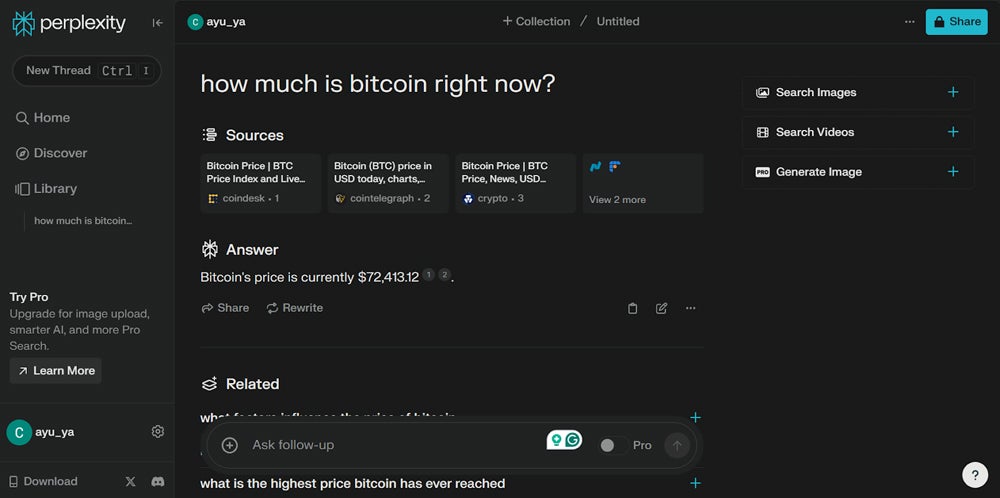 Perplexity’s first prompt was closest to the correct price and cited multiple sources.
Perplexity’s first prompt was closest to the correct price and cited multiple sources.
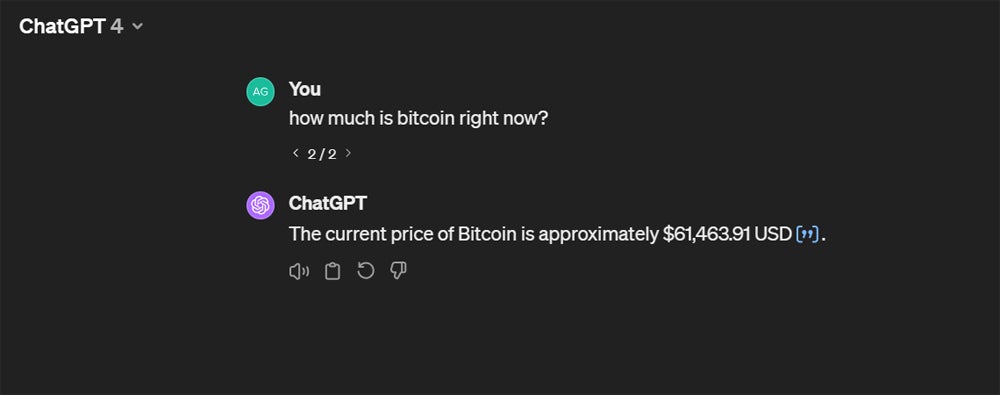 ChatGPT, however, gave an outdated answer even after two prompts, but linked to a site with the real-time Bitcoin price.
ChatGPT, however, gave an outdated answer even after two prompts, but linked to a site with the real-time Bitcoin price.
- Source citations: Unlike many AI platforms, Perplexity AI offers citations for its responses, ensuring users can trace the origin of the information. This level of transparency is invaluable in academic and professional settings where the credibility of sources isn’t negotiable.
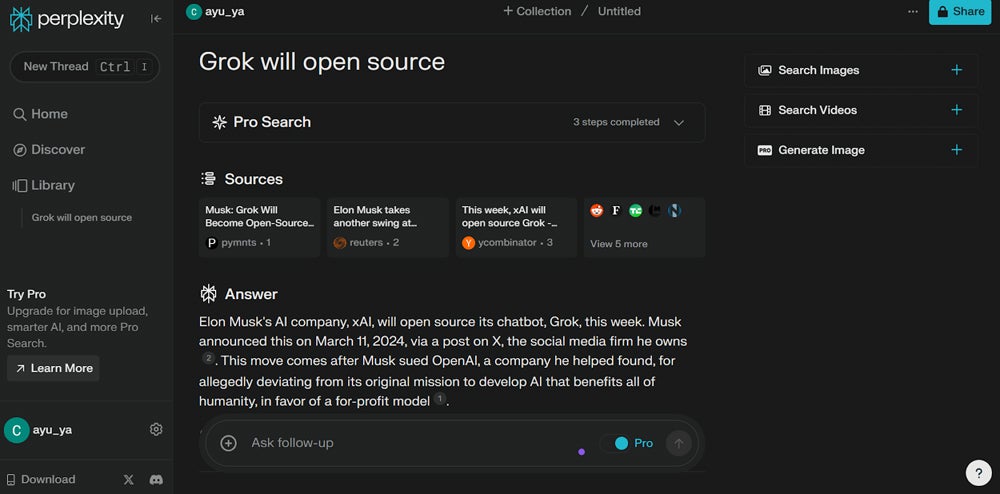 Perplexity providing multiple sources confirming that Grok, xAI’s chatbot, will be open source.
Perplexity providing multiple sources confirming that Grok, xAI’s chatbot, will be open source.
- Copilot interactive search: The Copilot feature, leveraging OpenAI’s GPT-4, enhances the search experience by engaging users with clarifying questions and summarizing results. This delivers more accurate responses, making it reliable for users navigating complex queries.
- Diverse content handling: Perplexity can research code to help you write code, write tables, research solutions to math problems, and summarize texts. It can also impressively understand complex queries using cutting-edge NLP, setting it apart from simpler Q&A or chatbot services.
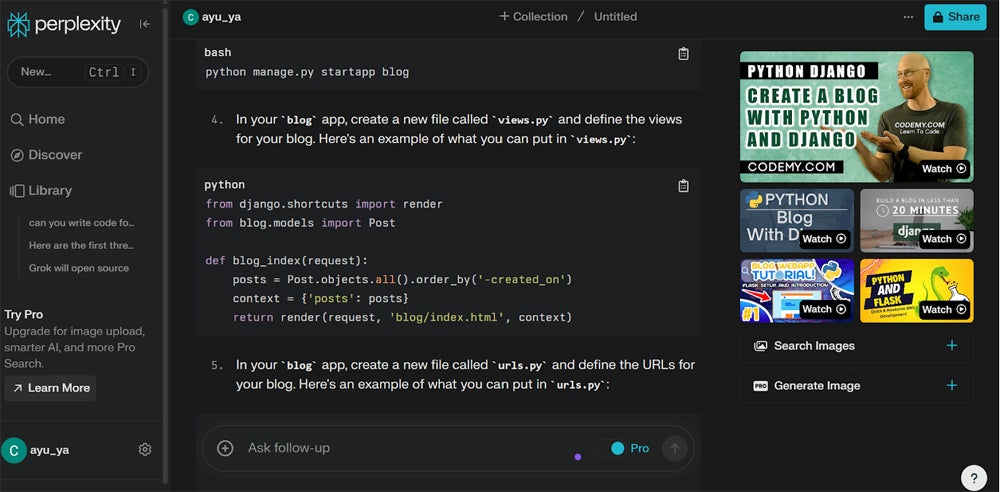 Perplexity’s feedback concerning writing code for a simple blog in Python.
Perplexity’s feedback concerning writing code for a simple blog in Python.
Pros
- Offers accurate and nuanced answers with a focus on providing source citations for reliability.
- Real-time search capability ensures information is always current and relevant.
- Versatile in handling a variety of content types, from text and code to tables and math problems.
- Personalization features tailor responses based on user interests and search history.
Cons
- May not be as effective for casual or conversational queries due to its academic focus.
- The depth and detail of information can be overwhelming for users seeking quick answers.
- Requires constant internet connectivity for real-time searches, limiting offline use.
- The focus on academic and research content may not appeal to all users.
![]()
ChatGPT Overview
ChatGPT is OpenAI’s biggest and most popular product as a result of how it revolutionized conversational AI with its ability to understand and generate human-like text.
One of its greatest capabilities is how it offers coherent and contextually relevant dialogue to keep users engaged across diverse topics. However, it doesn’t stop there; it expanded to process visual and sound (spoken word) inputs. This has made ChatGPT even more versatile and capable of a greater spectrum of conversational applications.
Key Features
- Multimodal capabilities: ChatGPT’s ability to process and generate responses from text, images, and audio inputs offers users a more interactive and engaging experience. This feature sets ChatGPT apart from competitors by allowing for richer, more context-aware conversations.
- DALL-E integration: Incorporating DALL-E’s image generation capabilities, ChatGPT can create detailed visuals from textual descriptions, making it useful for tasks requiring a blend of text and imagery. This integration is particularly useful for creative professionals as well as marketers who need to generate visual content alongside textual narratives.
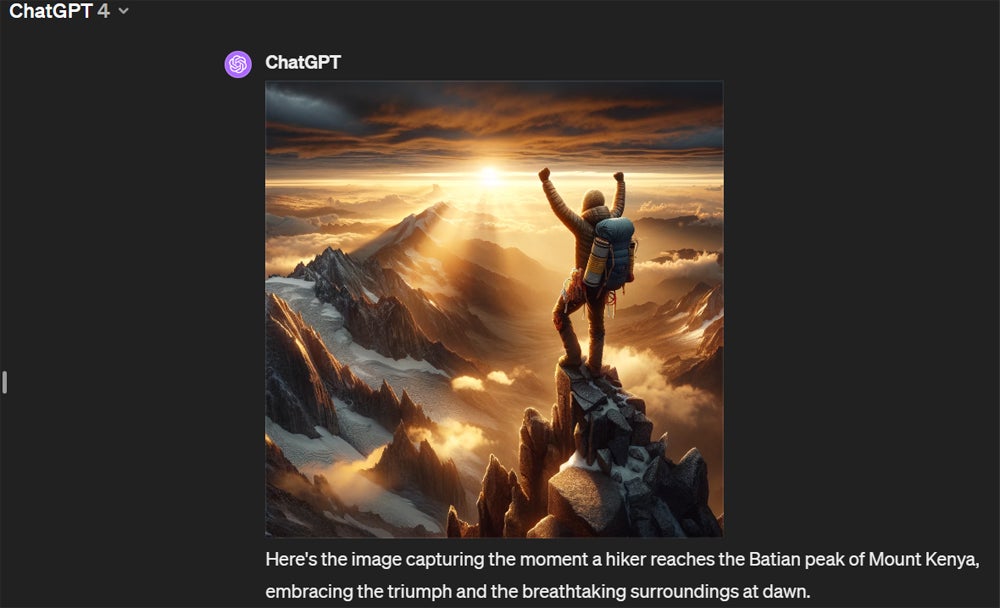 Using DALL-E straight from ChatGPT to show a hiker dangerously celebrating summiting Mt. Kenya.
Using DALL-E straight from ChatGPT to show a hiker dangerously celebrating summiting Mt. Kenya.
- Plugins and custom GPTs: The plugin system in ChatGPT gives users liberty to connect with a vast array of external services and tools, which significantly expands its functionality, though it’s being phased out. It’s being replaced by the already-live custom GPTs, which enable users to find, create, and publish custom ChatGPT versions.
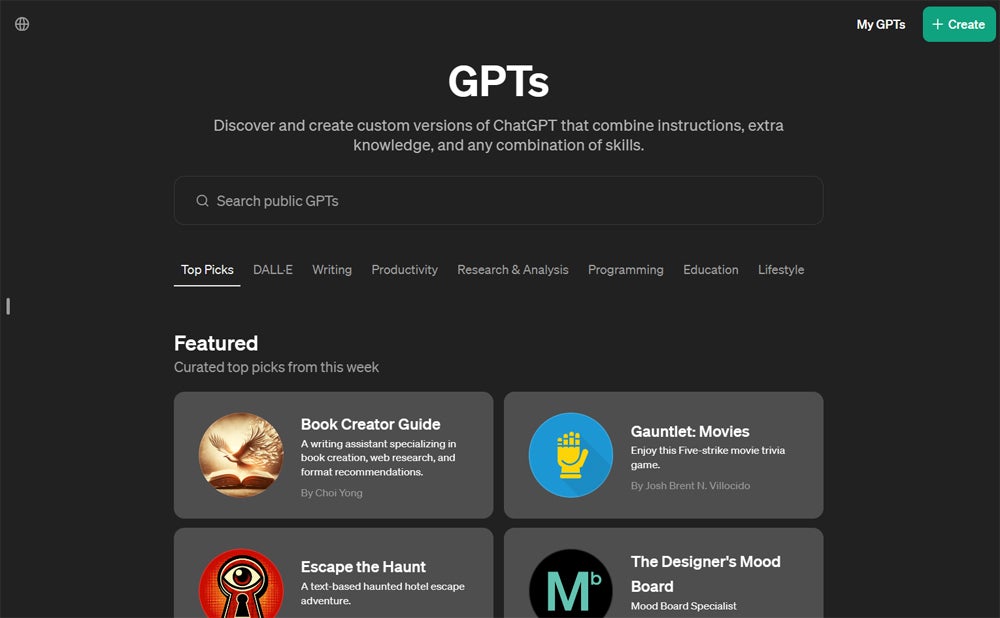 GPTs dashboard displaying multiple categories of public GPTs.
GPTs dashboard displaying multiple categories of public GPTs.
- Code and content creation: ChatGPT’s proficiency in generating programming code and diverse content types, from marketing copy to creative writing, makes it invaluable across many industries, including tech, marketing, and education.
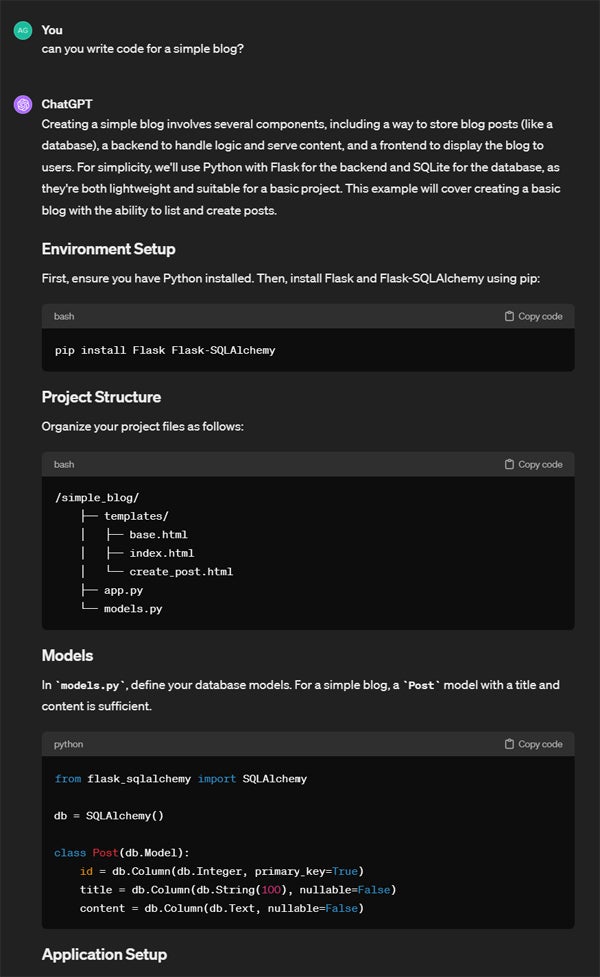 A prompt I gave Perplexity AI concerning a simple blog.
A prompt I gave Perplexity AI concerning a simple blog.
Pros
- Unmatched conversational abilities.
- Multimodal interaction support enhances ChatGPT’s user experiences.
- Regular updates and improvements ensure it remains innovative.
- It’s easy to use and offers extensive documentation and community support.
Cons
- While versatile, ChatGPT’s broad focus may not fit users seeking in-depth, specialized information.
- Multimodal features are still evolving, which may affect their reliability in certain applications.
- User content is used in training by default for any plan below the team plan; however, an option to opt-out is available.
- ChatGPT is notorious for giving inaccurate responses.
Best for Pricing: ChatGPT
Even though both offer a free plan and start their pricing plans at $20 per user per month, ChatGPT offers more pricing flexibility with added tiers for teams and enterprises: the Team plan starts at $25 per user per month while billed annually, and the Enterprise plan offers custom pricing.
Best for Core Features: Perplexity AI
This is highly subjective. However, as a researcher, I find that Perplexity AI excels in delivering accurate, source-cited information for in-depth research and gives detailed, reliable data.
The presentation of the data is also something to behold as it’s offered with lots of options on what to do next, the steps taken by the model, related topics, and more. ChatGPT, with its broad conversational capabilities, is versatile but doesn’t match the depth of content that Perplexity AI provides, especially for academic and professional research contexts.
Best for Ease of Implementation: ChatGPT
ChatGPT’s ease of integration and user-friendly API make it the better choice for developers and businesses looking to quickly implement AI conversational features.
Perplexity AI, while powerful, may require more specialized knowledge to fully leverage its research-oriented capabilities. Additionally, its research orientation already limits the scope of its use cases in comparison to ChatGPT.
Best for Accuracy: Perplexity AI
Accurate information is a big deal—and still a pain point for ChatGPT. ChatGPT can sound coherent but frequently manages to produce highly believable yet completely false, incorrect, or made-up information.
Perplexity AI, on the other hand, is committed to providing up-to-date, citation-backed information. It easily tops ChatGPT for accuracy. Its real-time search features are also ahead of ChatGPT, which still offers inaccurate and inconsistent answers, as we saw previously with the Bitcoin price prompt.
Best for Conversational AI: ChatGPT
Easily, ChatGPT wins this category as its advanced natural language processing makes it hard to compare with anything else when it comes to creating engaging, human-like conversations across a wide range of topics. It clearly surpasses Perplexity AI in general conversational applications.
Who Shouldn’t Use Perplexity AI or ChatGPT?
While Perplexity AI and ChatGPT offer advanced AI capabilities, it’s impossible for them to be the ideal fit for every user or scenario.
Who Shouldn’t Use Perplexity AI
Perplexity AI, with its focus on delivering detailed, citation-supported answers, might be a hard sell for users looking for quick, casual interactions or those who need AI assistance in creative content generation. Its emphasis on research and data accuracy makes it less suited for applications requiring broad, conversational AI capabilities.
Who Shouldn’t Use ChatGPT
ChatGPT may not meet the needs of users who require highly specialized, data-driven responses, particularly in academic or professional research contexts. Businesses or individuals needing AI tools with a strong emphasis on providing up-to-date, citation-backed information might find ChatGPT’s generalist approach less effective. Some may even consider ChatGPT to be “dumb” based on the responses it can give when required to deliver detailed and factual responses.
Best Alternatives to Perplexity AI and ChatGPT
While Perplexity AI and ChatGPT are powerful generative AI tools in their own right, there are other alternatives in the market that might better suit the needs of users that these two tools may not adequately serve. Here are a few notable AI alternatives:
![]()
ClickUp AI
ClickUp AI, part of the broader ClickUp productivity platform, introduces an AI assistant tailored to enhance task management and productivity. Unlike Perplexity AI and ChatGPT, which focus on search and conversational capabilities, ClickUp AI integrates AI directly into workflow management, making it ideal for teams looking to streamline project tasks with AI assistance.
![]()
Jasper AI
Jasper goes beyond traditional AI chat interfaces to offer a platform aimed at content creation. It leverages AI to help users generate a wide range of content, from marketing copy to blog posts. This makes Jasper a strong alternative for users whose primary interest is in leveraging AI for creative and content generation tasks, differing from Perplexity AI’s research-focused tool as well as ChatGPT’s conversational breadth.
![]()
Komo
Komo offers a minimalist and sleek approach to AI-driven interactions, focusing on simplicity and ease of use. It provides a contrast to Perplexity AI’s depth of information and ChatGPT’s extensive AI conversational capabilities, catering to users who prefer a straightforward, no-frills generative AI tool for quick inquiries and interactions.
Review Methodology: Evaluating Perplexity AI vs. ChatGPT
We based our review of Perplexity AI and ChatGPT on a handful of factors that helped us differentiate each platform. These were pricing, features, user experience, and accuracy.
- Pricing: We looked at how each tool approached pricing and examined how flexible their pricing options are. Both platforms offer a free tier and start their premium tiers at $20 per user per month.
- Core features: Then we examined the strongest use cases of each generative AI tool and how each tool approached the features under its scope. For Perplexity AI, we had a look at its real-time web search capabilities, source citations, and the quality of its research-oriented responses. We evaluated ChatGPT’s conversational AI capabilities, content generation diversity, and multimodal interaction features.
- User experience: The questions we asked ourselves here included how easy each platform was to use and understand and how fast it was to pick up and start using each of the two. We considered the intuitiveness of the platforms, the learning curve for new users, and the accessibility of key features.
- Accuracy and reliability: We scrutinized the accuracy of information provided by Perplexity AI and the AI conversational relevance and coherence of ChatGPT’s responses. We also compared the real-time web searching capabilities of the two with a simple test of getting the price of Bitcoin in real time.
FAQs: Perplexity AI vs. ChatGPT
What is the difference between Perplexity AI and ChatGPT?
Perplexity AI is primarily an AI-powered search assistant designed to provide accurate, citation-backed answers from the web that’s great for research and academic inquiries. On the other hand, ChatGPT is a conversational AI model capable of generating human-like text responses, making it versatile for a wide range of applications from casual conversations to content creation.
How accurate are both AI?
Perplexity AI’s accuracy is highlighted by its ability to cite sources for the information it provides, cementing its use case in research and academia. ChatGPT falls short in comparison as its accuracy varies based on the input and the context of the conversation. It’s also designed to provide plausible responses based on patterns in its training data, which often yields inaccurate responses.
Which is better? Perplexity or ChatGPT?
The choice between Perplexity AI and ChatGPT depends on the user’s needs. For users who need detailed, source-based information for research or academic purposes, Perplexity AI is the better choice. And for those who want a more versatile tool with a broader range of applications, ChatGPT becomes the better option.
Bottom Line: Perplexity AI vs ChatGPT
We’ve seen that Perplexity AI excels in delivering accurate, citation-backed information, while ChatGPT’s dynamic AI conversational capabilities shine. However, your choice will come down to whether you lean toward the rather fluid conversational applications of AI, which favors ChatGPT, or whether you prefer to use AI for a more structured and highly detailed approach to sourcing correct information, which favors Perplexity AI. In truth, these two AI apps are as distinct as night and day, which should make your choice an easy one.
For a full portrait of the AI vendors serving a wide array of business needs, read our in-depth guide: 150+ Top AI Companies 2024


